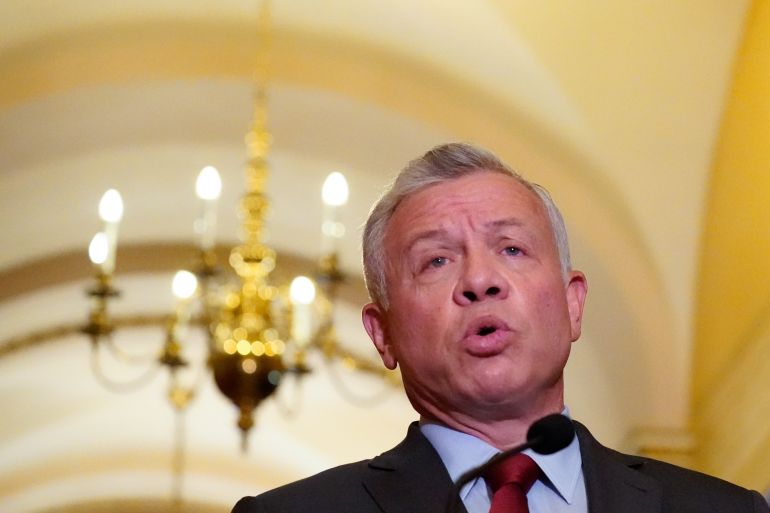Jordan king exposed over tax havens and luxury homes
So-called Pandora Papers says King Abdullah II is among dozens of world leaders secretly holding millions of dollars offshore.

Jordan’s King Abdullah II is among dozens of world leaders to have hidden millions of dollars in offshore tax havens and secretly bought luxury homes around the globe, according to an investigation published on Sunday.
The so-called Pandora Papers probe involving some 600 journalists is based on the leak of some 11.9 million documents from 14 global financial services.
Keep reading
list of 4 itemsPeru kicks off corruption case against Keiko Fujimori
China’s anti-corruption watchdog eyes new target: alcohol
Tunisia: Former anti-corruption chief placed under house arrest
The documents show how King Abdullah II created a network of offshore companies and tax havens to amass a $100m property empire from Malibu, California to Washington, DC and London.
According to the investigation: “Three beachfront mansions in Malibu [were] purchased through three offshore companies for $68 million by the King of Jordan in the years after Jordanians filled the streets during Arab Spring to protest joblessness and corruption.”
Abdullah, 59, also owns three luxury apartments in a complex in Washington, DC, with panoramic views of the Potomac River, and a house in Ascot, one of England’s most expensive towns, along with multimillion-dollar apartments in central London, the report said.
“Jordan doesn’t have the kind of money that other Middle Eastern monarchies, like Saudi Arabia, have to allow a king to flaunt his wealth,” Annelle Sheline, a Middle East scholar, was quoted as saying.
“If the Jordanian monarch were to display his wealth more publicly, it wouldn’t only antagonize his people, it would p**s off Western donors who have given him money.”
The royal palace said on Monday that King Abdullah’s properties in the US and UK were “no secret”, and that privacy and security reasons were behind not disclosing it.
“This is not unusual nor improper,” said the royal palace statement.
“The cost of these properties and all related expenditures have been personally funded by His Majesty. None of these expenses have been funded by the state budget or treasury,” the statement continued.
The Jordanian palace said these properties were used during official visits and some of these are used during private visits.
King Abdullah’s lawyers were cited saying all the properties were bought with personal wealth, and it was common practice for high-profile individuals to buy properties via offshore companies for privacy and security reasons.
“Any implication that there is something improper about ownership of property through companies in offshore jurisdictions is categorically denied,” said DLA Piper, the law firm that represents the monarch.
“[Abdullah] has not at any point misused public monies or made any use whatsoever of the proceeds of aid or assistance intended for public use.”
336 high-level politicians
Some 35 current and former leaders are featured in the documents analysed by the International Consortium of Investigative Journalists (ICIJ) – facing allegations ranging from corruption to money laundering and global tax avoidance.
The documents also show Czech Prime Minister Andrej Babis – facing an election later this week – failed to declare an offshore investment company used to buy a chateau worth $22m in the south of France.
In total, the ICIJ found links between almost 1,000 companies in offshore havens and 336 high-level politicians and public officials, including country leaders, cabinet ministers, ambassadors and others.
More than two-thirds of the companies were set up in the British Virgin Islands.
In most countries, the ICIJ stresses, it is not illegal to have assets offshore or to use shell companies to do business across national borders.
But such revelations are no less of an embarrassment for leaders who may have campaigned publicly against corruption, or advocated austerity measures at home.
“The new data leak must be a wake-up call,” said Sven Giegold, a Green party lawmaker in the European Parliament. “Global tax evasion fuels global inequality. We need to expand and sharpen the countermeasures now.”
Aliyev and Kenyatta on the list
Among the other revelations from the ICIJ investigation:
- Family and associates of Azerbaijani President Ilham Aliyev are alleged to have been secretly involved in property deals in Britain worth hundreds of millions.
- Kenyan President Uhuru Kenyatta and six family members are alleged to secretly own a network of offshore companies.
- Members of Pakistan Prime Minister Imran Khan’s inner circle, including cabinet ministers and their families, are said to secretly own companies and trusts holding millions of dollars.
- Russian President Vladimir Putin is not directly named in the files, but he is linked via associates to secret assets in Monaco.
The Pandora Papers are the latest in a series of mass ICIJ leaks of financial documents that started with LuxLeaks in 2014, and was followed by the Panama Papers, the Paradise Papers and FinCen.
The documents behind the latest investigation are drawn from financial services companies in countries including the British Virgin Islands, Panama, Belize, Cyprus, the United Arab Emirates, Singapore and Switzerland.
The latest bombshell is even more expansive than the Panama Papers, porting through nearly 3 terabytes of data — the equivalent of roughly 750,000 photos on a smartphone — leaked from 14 different service providers doing business in 38 different jurisdictions in the world.
The records date back to the 1970s, but most of the files span from 1996 to 2020.